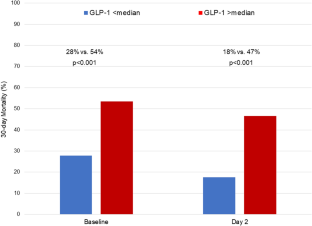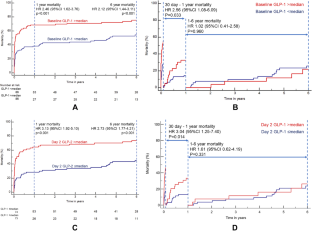Abstract
Background
Glucagon-like peptide-1 (GLP-1) is a gut-derived peptide secreted in response to nutritional and inflammatory stimuli. Elevated GLP-1 levels predict adverse outcome in patients with acute myocardial infarction or sepsis. GLP-1 holds cardioprotective effects and GLP-1 receptor agonists reduce cardiovascular events in high-risk patients with diabetes. In this study, we aimed to investigate the capacity of GLP-1 to predict outcome in patients with cardiogenic shock (CS) complicating myocardial infarction.
Methods
Circulating GLP-1 levels were serially assessed in 172 individuals during index PCI and day 2 in a prospectively planned biomarker substudy of the IABP-SHOCK II trial. All-cause mortality at short- (30 days), intermediate- (1 year), and long-term (6 years) follow-up was used for outcome assessment.
Results
Patients with fatal short-term outcome (n = 70) exhibited higher GLP-1 levels [86 (interquartile range 45–130) pM] at ICU admission in comparison to patients with 30-day survival [48 (interquartile range 33–78) pM; p < 0.001] (n = 102). Repeated measures ANOVA revealed a significant interaction of GLP-1 dynamics from baseline to day 2 between survivors and non-survivors (p = 0.04). GLP-1 levels above vs. below the median proved to be predictive for short- [hazard ratio (HR) 2.43; 95% confidence interval (CI) 1.50–3.94; p < 0.001], intermediate- [HR 2.46; 95% CI 1.62–3.76; p < 0.001] and long-term [HR 2.12; 95% CI 1.44–3.11; p < 0.001] outcome by multivariate Cox-regression analysis.
Conclusion
Elevated plasma levels of GLP-1 are an independent predictor for impaired prognosis in patients with myocardial infarction complicated by CS. The functional relevance of GLP-1 in this context is currently unknown and needs further investigations.
Trial registration
www.ClinicalTrials.gov Identifier: NCT00491036.
Graphical abstract




Similar content being viewed by others
Data availability
Data sharing maybe possible on a reasonable scientific request.
Abbreviations
- CS:
-
Cardiogenic shock
- ELISA:
-
Enzyme-linked immunosorbent assay
- GLP-1:
-
Glucagon-like peptide-1
- IABP:
-
Intra-aortic balloon counterpulsation
- IQR:
-
Interquartile range
- MODS:
-
Multiple organ failure
- PCI:
-
Percutaneous coronary intervention
- SIRS:
-
Systemic inflammatory response syndrome
- TIMI:
-
Thrombolysis in myocardial infarction
- IL-6:
-
Interleukin-6
References
Thiele H, Ohman EM, de Waha-Thiele S et al (2019) Management of cardiogenic shock complicating myocardial infarction: an update 2019. Eur Heart J 40:2671–2683. https://doi.org/10.1093/eurheartj/ehz363
Shimizu K, Ogura H, Goto M et al (2006) Altered gut flora and environment in patients with severe SIRS. J Trauma 60:126–133. https://doi.org/10.1097/01.ta.0000197374.99755.fe
Baggio LL, Drucker DJ (2007) Biology of incretins: GLP-1 and GIP. Gastroenterology 132:2131–2157. https://doi.org/10.1053/j.gastro.2007.03.054
Drucker DJ (2016) The Cardiovascular Biology of Glucagon-like Peptide-1. Cell Metab 24:15–30. https://doi.org/10.1016/j.cmet.2016.06.009
Diebold S, Moellmann J, Kahles F et al (2018) Myocardial infarction is sufficient to increase GLP-1 secretion, leading to improved left ventricular contractility and mitochondrial respiratory capacity. Diabetes Obes Metab 20:2911–2918. https://doi.org/10.1111/dom.13472
Kahles F, Ruckbeil MV, Mertens RW et al (2020) Glucagon-like peptide 1 levels predict cardiovascular risk in patients with acute myocardial infarction. Eur Heart J 41:882–889. https://doi.org/10.1093/eurheartj/ehz728
Thiele H, Schuler G, Neumann FJ et al (2012) Intraaortic balloon counterpulsation in acute myocardial infarction complicated by cardiogenic shock: design and rationale of the Intraaortic Balloon Pump in Cardiogenic Shock II (IABP-SHOCK II) trial. Am Heart J 163:938–945. https://doi.org/10.1016/j.ahj.2012.03.012
Thiele H, Zeymer U, Neumann FJ et al (2012) Intraaortic balloon support for myocardial infarction with cardiogenic shock. NEnglJMed 367:1287–1296. https://doi.org/10.1056/NEJMoa1208410
Thiele H, Zeymer U, Neumann FJ et al (2013) Intra-aortic balloon counterpulsation in acute myocardial infarction complicated by cardiogenic shock (IABP-SHOCK II): final 12 month results of a randomised, open-label trial. Lancet 382:1638–1645. https://doi.org/10.1016/S0140-6736(13)61783-3
Thiele H, Zeymer U, Thelemann N et al (2019) Intraaortic balloon pump in cardiogenic shock complicating acute myocardial infarction. Circulation 139:395–403. https://doi.org/10.1161/CIRCULATIONAHA.118.038201
Fuernau G, Poenisch C, Eitel I et al (2014) Growth-differentiation factor 15 and osteoprotegerin in acute myocardial infarction complicated by cardiogenic shock: a biomarker substudy of the IABP-SHOCK II-trial. Eur J Heart Fail 16:880–887. https://doi.org/10.1002/ejhf.117
Kahles F, Meyer C, Mollmann J et al (2014) GLP-1 secretion is increased by inflammatory stimuli in an IL-6-dependent manner, leading to hyperinsulinemia and blood glucose lowering. Diabetes 63:3221–3229. https://doi.org/10.2337/db14-0100
Lebherz C, Kahles F, Piotrowski K et al (2016) Interleukin-6 predicts inflammation-induced increase of Glucagon-like peptide-1 in humans in response to cardiac surgery with association to parameters of glucose metabolism. Cardiovasc Diabetol 15:21. https://doi.org/10.1186/s12933-016-0330-8
Lebherz C, Schlieper G, Mollmann J et al (2017) GLP-1 levels predict mortality in patients with critical illness as well as end-stage renal disease. Am J Med 130(833–41):e3. https://doi.org/10.1016/j.amjmed.2017.03.010
Steven S, Hausding M, Kroller-Schon S et al (2015) Gliptin and GLP-1 analog treatment improves survival and vascular inflammation/dysfunction in animals with lipopolysaccharide-induced endotoxemia. Basic Res Cardiol 110:6. https://doi.org/10.1007/s00395-015-0465-x
Marsico F, Paolillo S, Gargiulo P et al (2020) Effects of glucagon-like peptide-1 receptor agonists on major cardiovascular events in patients with Type 2 diabetes mellitus with or without established cardiovascular disease: a meta-analysis of randomized controlled trials. Eur Heart J 41:3346–3358. https://doi.org/10.1093/eurheartj/ehaa082
Funding
The IABP-SHOCK II trial was funded by grants from the German Research Foundation, the German Heart Research Foundation, the German Cardiac Society, Arbeitsgemeinschaft Leitende Kardiologische Krankenhausärzte, and the Heart Center Leipzig at University of Leipzig, and by unrestricted grants from Maquet Cardiopulmonary and Teleflex Medical. This work was supported by the German Research Foundation (DFG) SFB/TRR219 (M-04 and M-05), Project-ID 403224013 and Interreg V-A grant EURlipids to ML as well as the CORONA Stiftung, Germany to NM.
Author information
Authors and Affiliations
Corresponding authors
Ethics declarations
Conflict of interest
ML received grants and personal fees from Boehringer Ingelheim, grants and personal fees from MSD, grants and personal fees from Novo Nordisk, personal fees from Amgen, personal fees from Sanofi, personal fees from Astra Zeneca, personal fees from Bayer, personal fees from Lilly. FK has served as a speaker for Novo Nordisk, JM declares no conflict of interest, NM has served as speaker for Amgen, Bayer, Boehringer Ingelheim, Sanofi-Aventis, MSD, BMS, AstraZeneca, Lilly, NovoNordisk. All other authors declare no conflict of interests.
Rights and permissions
Springer Nature or its licensor (e.g. a society or other partner) holds exclusive rights to this article under a publishing agreement with the author(s) or other rightsholder(s); author self-archiving of the accepted manuscript version of this article is solely governed by the terms of such publishing agreement and applicable law.
About this article
Cite this article
Lehrke, M., Fuernau, G., Jung, C. et al. GLP-1 in patients with myocardial infarction complicated by cardiogenic shock—an IABP-SHOCK II-substudy. Clin Res Cardiol (2024). https://doi.org/10.1007/s00392-023-02366-2
Received:
Accepted:
Published:
DOI: https://doi.org/10.1007/s00392-023-02366-2




